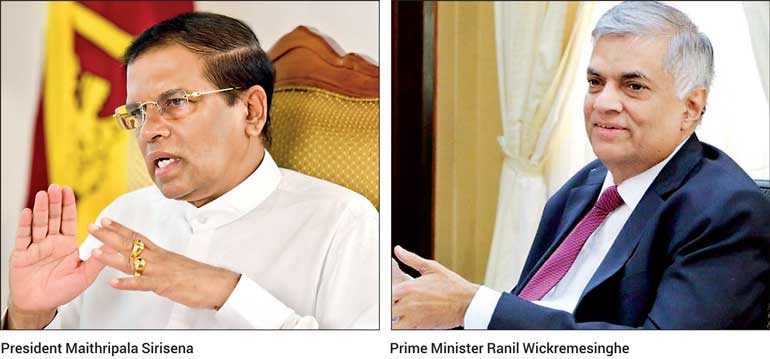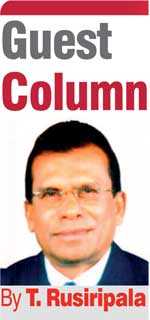Wednesday Feb 18, 2026
Wednesday Feb 18, 2026
Monday, 17 June 2019 00:00 - - {{hitsCtrl.values.hits}}

Strange are the things we are witnessing in the political scene. The fast-evaporating trust and confidence in politicians and the Government are seriously destroying the harmony of the nation.
The Prime Minister of the country has admitted that the public is clamouring to change the entire assemblage of the 225 Parliamentarians.
He was probably voicing the prevailing discontent that could be heard everywhere, or is it the death knell of the old and famous definition of democracy, “a government of all the people, by all the people, and for all the people”, that we hear?
While there are several reasons for this great discontent, the collision course of the powers that be of the Government that stay put appears to be the most serious contributing factor. The friction that appears to be developing fast between the Government and the President is coming to a virtual point of no return. 
January 2015 marked a watershed in the political landscape of a country focused and pressured to bring about a change of a system of governance that the majority expected for the Government to become more open and more real to the people.
Political buzzwords such as good governance and anti-corruption augured well to meet the minds of those who aspired major adjustments to the way the country was run and to the assumptions that underpin such. It was essentially an election by political groups manoeuvring to change a regime pandering on to popular priorities rather than looking up to a political leader stating what his vision is for the society going beyond the popular platitudes of bringing about prosperity and fairness.
Those who were associated with the exercise were a heterogeneous group with diverse interests regarding their own perceptions on governance and policies. It appears that they were all settled for the need to get elected somehow with survival as the target rather than progress. This aspect became very clear in their actions during the self-imposed short period of governance. Their main objective was to get re-elected with more power over their former rivals now grouped together temporarily. The short-lived 100-day Government dissolved without accomplishing many promises they gave, which bears ample testimony to this.
Agreement and disagreement are two sides of the same coin. There were many instances of disagreement on policy matters among the constituent parties during that government, so much so that eventually, it went on a collision course. This led to the creation of two groups in the Government; one, of the President and the other of the Prime Minister. The different views of the two groups surfaced regarding several sensitive issues. The UNHCR resolution no. 30/1 of 2015 is a case where there were many divergent views regarding its coverage. How the disputed numbers of missing persons differed from diplomatic dispatches and the Red Cross to what was claimed in Geneva, is history today. President Sirisena did not agree to foreign judges and the 40,000 attributed to genocide.
The appointment of Arjuna Mahendran as the Governor of the CBSL was another controversial episode where there was serious disagreement between the President and the Prime Minister. Disregarding the adverse counts against this appointment on the grounds that he was a non-citizen and his record as an investment banker open only to speculative transactions, he was appointed to that highly sensitive post in the country. The consequences of this unwarranted decision is now obvious. Perhaps President Sirisena had foresight or some prior warning of what was in store. Nevertheless the concerns were bulldozed and the appointment made with dire, irreparable consequences to the economy and the whole nation.
There have been many reported and unreported incidents of policy issues where there have been serious disagreements between the President and the Ranil Wickramasinghe section of the Government. Allocation of huge extents of lands to foreigners in the Hambantota area, signing of a trade agreement with Singapore, proposed amendments to the land allocation policies, and disputes regarding Cabinet appointments are few such.
With regard to the strategic policy plans concerning the development of the country, there appeared to be irreconcilable viewpoints and divergent approaches between the Prime Minister and the President. The Vision statement of the President announcing the ‘Sustainable Sri Lanka Vision 2030 Strategic Path’ is a clear instance. The Prime Minister had announced a three-year Economic Delivery Program (EDP), prepared with the help of Harvard University’s Centre for International Development (HCID) by engaging Mc Kinsey and Company at a cost of $ 3 million. The President’s Strategic Plan was prepared by local specialists under the Presidential Specialist Committee on the lines of a balanced universal green development initiative whereas the Prime Minister’s economic plan originated in US-based Harvard University. The Prime Minister thereafter issued another policy document titled Vision 2025 supplementing the EDP. These are clear instances of divergent views between the Prime Minister and the President with regards to policy on development.
The decision to prorogue the Parliament, remove the Prime Minister and dissolve Parliament in order to pave the way for fresh elections to end this state of affairs are the other events that culminated in the collision course that we are witnessing. The proposal to enter into a military agreement called ‘SOFA’ with the US has become another bone of contention. There is strong opposition by members of the general public as well as persons of very high integrity and social status, including religious dignitaries, against this move. But it appears that the Prime Minister and his group in the Government are going ahead with the proposal disregarding the opposition from the public.
Ranil’s Government was least concerned about the erosion of national sovereignty arising from the US-led Human Rights Council resolution 30/1. In addition, there is an active and open collaboration of Sri Lanka’s ruling elite under the guise of good governance. International think tanks and western-oriented corporates are influencing the policies and development plans which in the long run could have adverse effects on our independence and impartiality as a nation.
The President had to take the Police department under him to effectively control the drug menace. The country was shocked with the revelations made recently following major hauls which reflects how freely the trade had been thriving before.
In the middle of these serious policy divergences, the terrorist attack on 21 April is being used to cover up the irresponsible and negligent manner in which national security had been handled. The decision by the Parliament to appoint a Select Committee and also to give media publicity to its proceedings appears to be a step that is not helpful to the ongoing investigations and police inquiries. The President had appointed a Presidential Commission to inquire and report on the matter which would address the issues.
All these steps point to the fact that the Ranil Wickremesinghe Government is on an open collision course with the President. It is true that the powers the President had at the time of his election to Office have been pruned and some that have been left as Presidential powers are only limited to his term of Office. Even his term of Office mandated by the people who voted him into power has been reduced.
But it is time for the President to take serious note of the perpetrations by concerned elements to negate the fundamental rights of the people and their sovereignty by resorting to unilateral measures against public interest. It is prudent to consider the Executive powers vested in the President after the 19th Amendment and use them to counter any biased and unilateral actions contemplated disregarding the public views.
According to section 43(1), the President shall, in consultation with the Prime Minister where he considers such consultation to be necessary, determine the number of Ministers of the Cabinet and the Ministries and the assignment of subjects and functions to such Ministers.
And, according to Provision 43(3) of the Constitution, “the President may at any time change the assignment of subjects and functions, and the composition of the Cabinet of Ministers.
The public of this country are anxiously waiting to elect 225 Parliamentarians acceptable to them. Until that is done in a short time from now, the country does not need a jumbo Cabinet to run the affairs. It is high time this matter be considered seriously and steps be taken to reduce the Cabinet to about three Ministers. There can be a sufficient number of Deputy Ministers who can be assigned the subjects and functions of the Ministries to assist the Ministers. According to the Constitution, there can be 40 such Deputies and non-Cabinet Ministers.
The country’s economy is in dire straits. Although serious austerity measures are required, the Government is not taking any initiative in this direction. The next General election can be held immediately if the Parliament decides to do so. Otherwise it can be held at the earliest it could be held according to the constitutional provisions. A reduction in the number of Cabinet Ministers at a time like this will be most welcome by the people.